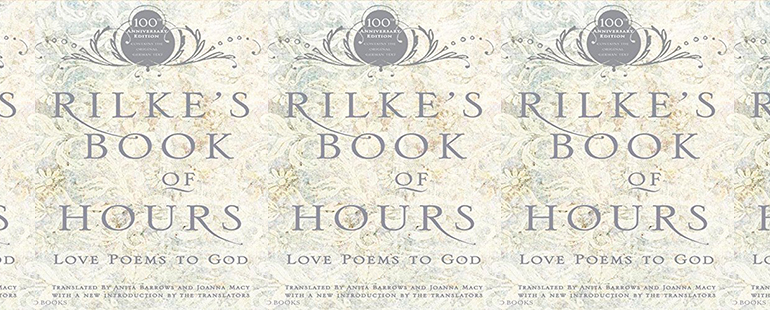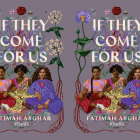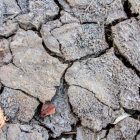Reading Rilke in Lockdown

In the first poem of Rainer Maria Rilke’s The Book of Poverty and Death, the third section of his early collection The Book of Hours (1905), he writes:
It feels as though I make my way
through massive rock
like a vein of ore
alone, encased.I am so deep inside it
I can’t see the path or any distance:
everything is close
and everything closing in on me
has turned to stone.
Rilke had a difficult early life, “an anxious, heavy childhood,” as he put it, marked by frequent illness and expulsion from military school. And yet he was also a profoundly hopeful and spiritual man, with an unwavering belief in the sacredness of the world, and of humanity. In The Book of Hours’s first section, The Book of Monastic Life, he writes, “I come home from the soaring / in which I lost myself. / I was song, and the refrain which is God / is still roaring in my ears.”
I bought The Book of Hours in 2019 when I was going to a writer’s workshop. The leader asked us to bring our favorite book of poetry; I didn’t have a favorite book of poetry—I didn’t have any books of poetry—but Rilke’s 1910 novel The Notebooks of Malte Laurids Brigge had had a large effect on me when I’d read it a few years earlier, and I thought I’d give his poetry a try. The Notebooks of Malte Laurids Brigge is the story of a sensitive and alienated young man despondent over the urban misery he sees around him in Paris but unable to cross the chasm between himself and others. I saw much of myself in him, and I saw in Rilke a writer with a fathoms-deep capacity for grace and love.
The translation of The Book of Hours I purchased, made by Anita Barrows and Joanna Macy in 1996, is mercifully plain. Having never read or studied poetry, densely ornamented verse is difficult for me to parse, and I’m always grateful when I feel that I’ve understood a poet’s intentions. And in The Book of Hours, subtitled Love Poems to God, I see a young man seeking to understand God and himself, in search of things “to meet and be met.” He finds divinity everywhere, in the beautiful and the tragic. In one poem lamenting the poverty of lost and rotting cities, Rilke speaks of children spending their days in shadowed doorways; in the next breath he regrets that they do not know “somewhere wind is blowing through a field of flowers.” This is not poetry of condemnation or anger or doubt, nor is it meant to spur social change, but it recognizes what Rilke saw as God’s presence in even the bleakest corners, and receives that presence with love, joy, and awe. He closes the collection with gratitude for a deep power that works the poet “ever more lightly, in ways I can’t make out.”
I’ve found myself turning to these poems again and again over the last year. Rilke’s longing for God mirrors my own longing for meaning amid so much tragedy. And though in this last year I have often, or more likely have been always filled with some mixture of condemnation, anger, and doubt, Rilke’s words give me space to release myself from the prison of my own feelings, and offer an alternative, even curative, way to live in the world. “Let everything happen to you,” he writes, “beauty and terror. / Just keep going. No feeling is final. / Don’t let yourself lose me.”
Rilke went to Paris in 1902 to produce a monograph on sculptor Auguste Rodin, but the poverty and decay he saw there were so depressing that he left after less than a year and fled to Viareggio, Italy, where he would walk in silence along the Mediterranean coast. There, if even the ocean got too loud, he could duck into the nearby woods and sit under a tree, his only companions a Bible and a copy of the 1880 Danish novel Niels Lyhne, by Jens Peter Jacobsen. Withdrawing from the world is a theme Rilke returns to often, and his musings on this, too, have given me great comfort, even if my withdrawal from friends and family is involuntary.
In Viareggio, Rilke also began correspondence with a young aspiring writer named Franz Xaver Kappus, who asked Rilke if he would give his thoughts on some poetry he’d written. Rilke declined to provide a critique, saying criticism of such a thing as a poem was inexpressible, but then went on to advise the young man on writing, life, nature, childhood, and memories. The two wrote back and forth for five years; their correspondence was collected and published as Letters to a Young Poet in 1929. In this brief but weighty book, Rilke’s search for the transcendent and the sacred is again beautifully expressed. When it appears Kappus has voiced dismay at having to spend the Christmas holiday alone, Rilke says this: “To almost everybody come hours when they would gladly exchange [solitude] for any sort of intercourse, however banal and cheap . . . But perhaps those are the very hours when solitude grows; for its growing is painful . . . But that must not mislead you. The necessary thing is after all but this: solitude, great inner solitude . . . this one must be able to attain.” People undergoing withdrawal in order to force harsh, personal introspection is as old as the Biblical story of the Jews wandering the desert. But reading Rilke’s take on withdrawal has helped remind me that there are things I can do to improve my mental state during lockdown, attitudes I can adopt that will serve me far better than pouring another glass of wine and infinitely scrolling Instagram.
Rilke also wrote at length about sadness, a subject he approaches with something almost like devotion, finding God’s grace even in suffering, and expressing deep gratitude for having grown and transformed from the experience. Our sadnesses “are the moments when something new has entered into us,” Rilke says, “and we have changed, as a house changes into which a guest has entered.” This new thing is the future, our future self given new understanding by a profound experience of grief. “The more still, more patient and more open we are when we are sad, so much the deeper and so much the more unswervingly does the new go into us.” Withdrawal into sadness was, for Rilke, an opportunity to be transformed. And he likely would have seen this transformation as more evidence of God’s divinity and man’s sacredness, manifest around him.
So many of us, myself especially, have learned through hard experience to put aside sadness, to deny it, mock it, repress it, scream it, or subdue it. The idea of running towards it with open arms is such a radical departure from the norm I’m not sure I understand even now all that Rilke intended with this advice. But I also know that I envy his courage and his depth of feeling.
Despite withdrawing on occasion, and despite having lost many loved ones during his too-short life, Rilke believed that those he’d lost were with him, “as predisposition, as burden upon our destiny, as blood that pulsates, as gesture that rises up out of the depths of time.” This profound hopefulness, this belief in carrying those we’ve lost, has brought me tremendous comfort over the last year, as well. It is timelessness that Rilke speaks of, generation connected to generation through blood and burden, no one ever truly lost who is remembered.
I can doom-scroll, I can self-medicate, I can distract and delay and check items off an infinite to-do list until the moment comes when my county lifts our lockdown measures and I find myself back in traffic, children screaming in the backseat, radio blaring contest info for a tour making its way to a venue nearby. Or I can allow myself to feel the weight of everything, and see as well the places where love and beauty flourish.
I didn’t quote the entire poem about making one’s way through solid rock. Rilke finishes it like this:
Still I don’t know enough about pain,
this terrible darkness makes me small.
If it’s you, though—press down hard on me, break in
that I may know the weight of your hand,
and you, the fullness of my cry.



